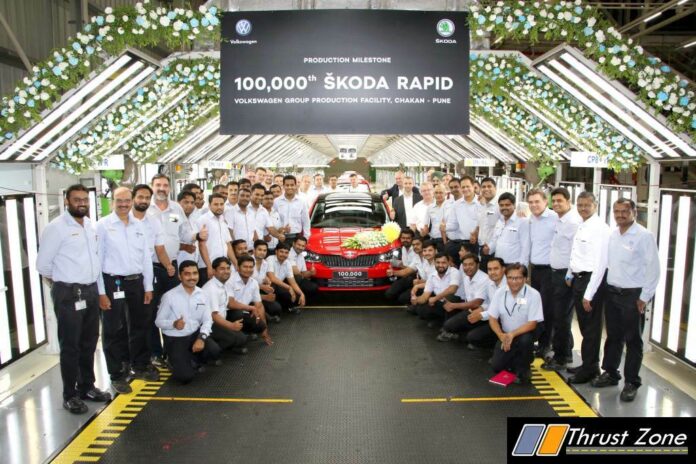SKODA AUTO India celebrates a new milestone in the company’s history: the production of the 100,000th SKODA RAPID at the Volkswagen Group production facility in Chakan, Pune. The celebratory flash red vehicle dons the Monte Carlo badge that pays homage to ŠKODA AUTO Motorsport Heritage and Rallye Monte Carlo.
The marque was previously used in the 1930s for the RAPID (Type 901) and in the 1980s for the rear engine RAPID Coupé. In November 2011, SKODA AUTO resurrected the RAPID nameplate for the subcontinent. The compact sedan was developed exclusively for the local market by SKODA AUTO India, a subsidiary of the Czech automobile manufacturer SKODA AUTO. The RAPID proved its mettle as a perfect blend of the brand’s timeless design ideals, unbending performance, superior build quality, enhanced safety and security, and European craftsmanship, all at a competitive price point. The RAPID marked SKODA AUTO’s foray into the popular C segment and garnered much appreciation from brand loyalists and auto enthusiasts from across the nation.
The new SKODA RAPID, introduced in late 2016, shares the emotive crystalline design cues with the rest of the SKODA AUTO product portfolio, among other elements: a plethora of safety and security modules, wealth of standard features and numerous ‘Simply Clever’ solutions. The vehicle is SKODA AUTO’s best seller in the Indian market setting benchmarks for functionality, practicality, and spaciousness in its segment. A tribute to the success of the Czech moniker at the legendary ‘Queen of Rallies’, the premium SKODA RAPID Monte Carlo combines luxury and glamour with pulse racing sports styling.
In July 2018, the Volkswagen Group confirmed an investment of INR 8,000 crore (EUR 1 billion) in the SKODA led ‘INDIA 2.0’ project. In January 2019, the Technology Center was inaugurated in Pune, laying the foundation for the development of products based on the sub-compact MQB-A0-IN platform tailored to the needs of customers in India. The future range of products, developed under the ‘INDIA 2.0’ project, will achieve localization levels of up to 95 percent. These vehicles will meet the same core standards for safety, quality, and design that the Volkswagen Group represents the world over. In the second phase of the project, Volkswagen Group will be examining the possibility of exporting vehicles built in India.



